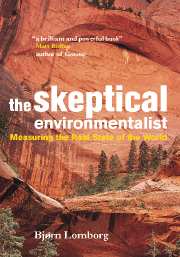Book contents
- Frontmatter
- Contents
- List of figures
- List of tables
- Preface
- Language and measures
- Acknowledgements
- Permissions
- Part I The Litany
- Part II Human welfare
- Part III Can human prosperity continue?
- 8 Are we living on borrowed time?
- 9 Will we have enough food?
- 10 Forests – are we losing them?
- 11 Energy
- 12 Non-energy resources
- 13 Water
- 14 Conclusion to Part III: continued prosperity
- Part IV Pollution: does it undercut human prosperity?
- Part V Tomorrow's problems
- Part VI The Real State of the World
- Notes
- Bibliography
- Index
13 - Water
Published online by Cambridge University Press: 05 March 2013
- Frontmatter
- Contents
- List of figures
- List of tables
- Preface
- Language and measures
- Acknowledgements
- Permissions
- Part I The Litany
- Part II Human welfare
- Part III Can human prosperity continue?
- 8 Are we living on borrowed time?
- 9 Will we have enough food?
- 10 Forests – are we losing them?
- 11 Energy
- 12 Non-energy resources
- 13 Water
- 14 Conclusion to Part III: continued prosperity
- Part IV Pollution: does it undercut human prosperity?
- Part V Tomorrow's problems
- Part VI The Real State of the World
- Notes
- Bibliography
- Index
Summary
There is a resource which we often take for granted but which increasingly has been touted as a harbinger of future trouble. Water.
Ever more people live on Earth and they use ever more water. Our water consumption has almost quadrupled since 1940. The obvious argument runs that “this cannot go on.” This has caused government agencies to worry that “a threatening water crisis awaits just around the corner.” The UN environmental report GEO 2000 claims that the water shortage constitutes a “full-scale emergency,” where “the world water cycle seems unlikely to be able to cope with the demands that will be made of it in the coming decades. Severe water shortages already hamper development in many parts of the world, and the situation is deteriorating.”
The same basic argument is invoked when WWF states that “freshwater is essential to human health, agriculture, industry, and natural ecosystems, but is now running scarce in many regions of the world.” Population Reports states unequivocally that “freshwater is emerging as one of the most critical natural resource issues facing humanity.” Environmental discussions are replete with buzz words like “water crisis” and “time bomb: water shortages,” and Time magazine summarizes the global water outlook with the title “Wells running dry.”
Information
- Type
- Chapter
- Information
- The Skeptical EnvironmentalistMeasuring the Real State of the World, pp. 149 - 158Publisher: Cambridge University PressPrint publication year: 2001
